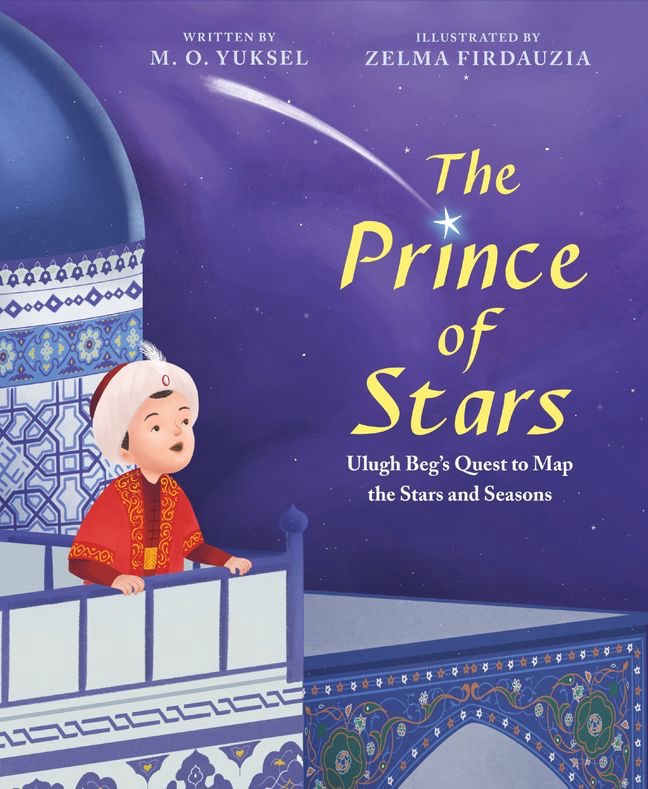We all know about scientists like Copernicus, Galileo, and Einstein. But have you ever heard of Ulugh Beg? If not, you’re not alone. Most of us grew up with the same familiar names in science, the ones who dominate our textbooks. Yet history is filled with brilliant thinkers we don’t know about whose contributions have shaped the way we understand the universe.
I first discovered Ulugh Beg while visiting Samarkand, Uzbekistan several years ago. I was mesmerized by his scientific discoveries. I remember thinking, Wow! Why have we never learned about this incredible astronomer in our classrooms? The more I read about his life, the more I wanted to share his story with the world.
Ulugh Beg was a 15th-century ruler who was far more interested in studying the stars than about politics or ruling an empire. From a young age, he was fascinated with science and math and questioned everything. Instead of relying on accepted wisdom and books written hundreds of years earlier, like those of Ptolemy, he wanted to measure and map the stars and planets himself.
In Samarkand, Ulugh Beg built the largest and most advanced observatory of its time. There he built the first permanently mounted astronomical instrument, cataloged over 1,000 stars, mapped constellations, and calculated Earth’s axial tilt with astonishing precision. His Zij-i-Sultani, or “Sultan’s Astronomical Tables,” became one of the most accurate star charts for centuries and was used across the world. And yet, many of us never hear his name in school.
What makes Ulugh Beg’s story even more remarkable is that he made the most accurate observations before the invention of the telescope or other modern technology. His calculations that a year is 365 days, 5 hours, 49 minutes, and 15 seconds was only off by 25 seconds from what we know today! And his measurement that the Earth’s axial tilt at 23.52 degrees from the plane of its orbit around the sun still remains the most accurate measurement to date.
In an era where we grew up thinking that science and faith can’t coexist, it was fascinating to learn that Ulugh Beg’s faith inspired his scientific pursuit. At the school he founded in Bukhara, a city in modern day Uzbekistan, he put up a plaque at the entrance with a well-known Hadith, Islamic teaching, stating: “Seeking knowledge is the duty of every Muslim man and woman.” Ulugh Beg took this to heart, seeing science not as separate from spirituality but as a way to honor the Creator. His work was both an intellectual pursuit and spiritual journey.
Stories like Ulugh Beg’s matter because when children only see certain faces or cultures represented in stories of discovery, they may start to believe that genius belongs to a select few. By learning about Ulugh Beg, children see that curiosity and discovery are universal and that people from all times, places, and faiths have contributed to human knowledge.
For Muslim children, Ulugh Beg’s story shares a powerful message that our heritage includes scientists, dreamers, and innovators who changed the world. For all children, it expands their understanding of who shapes history and reminds us that knowledge has always been built by many hands, across many cultures.
With the additional resources in the backmatter, I hope this book serves not just as a biography but also as an entry point to explore overlooked scientists, reflect on representation in history, engage in fun classroom STEM projects, and for children to be inspired to ask big questions and see themselves as scientists too.
M.O. Yuksel is an award-winning author of several children’s books, including In My Mosque, One Wish: Fatima al-Fihri and the World’s Oldest University, Ramadan Kareem, and Sami’s Special Gift: An Eid al-Adha Story. Her latest book, The Prince of Stars: Ulugh Beg’s Quest to Map the Stars and Seasons, explores the remarkable life of a 15th-century astronomer. Her goal is to craft the stories she longed for as a child, ones that inspire, uplift, and celebrate the rich diversity of our world. Learn more at www.moyuksel.com.
